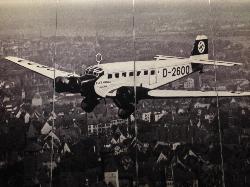Drexel Spring Break in Germany:
Rise of the Nazi Police System

Explore Munich, the birthplace of the Nazi Party, and experience firsthand the legacy of Germany's darkest era. Walk the public square where Adolf Hitler’s failed 1923 coup unfolded and reflect at the Dachau Memorial, Germany's first concentration camp. Witness how Munich has transformed from a city defined by Nazi terror to one of Europe's most culturally vibrant cities, preserving Bavarian traditions while continuing to reconcile with its past.
Travel next to Nuremberg, the ideological heart of Nazi Germany, to explore the Nazi Party Rally Grounds and the unfinished Congress Hall. Here, students will learn how the Nazis employed the myth of Volksgemeinschaft—the "People’s Community"—to justify a regime of total control and surveillance. Visit the Hall of Justice and Courtroom 600, the historic site of the Nuremberg Trials, where Nazi leaders faced accountability for their atrocities during WWII.
The program culminates in Berlin, Germany’s dynamic capital, where the rise and fall of oppressive regimes reveal poignant lessons in resilience, resistance, and remembrance. In Berlin, visit the Reichstag Dome and experience a guided tour and lecture highlighting Germany's journey from totalitarian rule to democratic governance. Engage with history at the Topography of Terror Museum and the German Resistance Memorial Center, understanding how ordinary citizens resisted Nazi tyranny at immense personal risk.
The course then transitions from Nazi-era policing to the examination of life under the authoritarian rule of East Germany’s Stasi. Visits to the Stasi Museum and DDR Museum will auggest how East German society endured pervasive mass surveillance, total control, and daily terror. Throughout the course, students will grapple with central themes such as the structures of authoritarian policing, mechanisms of mass surveillance, resistance movements, and the human capacity for both oppression and resilience.
Our journey underscores how sites once synonymous with oppression have evolved into vibrant spaces of historical remembrance and cultural celebration, prompting us to continually reflect: Could such authoritarian practices emerge today, even in societies historically committed to democracy?
Credit/Registration
Students will be registered for CJS T280 Rise of the Nazi Police System, 3 credit course spring term course. Students must leave space for this 3 credits in their credit load or will have to pay for exceeding the credit maximum. There are no pre-requisites for this class.
Instructors
Dr. Robert Kane, Department Head of Criminology and Justice Studies
Dr. Cyndi Rickards,Teaching Professor of Criminology & Justice Studies
Arrival Date: March 23, 2026
Departure Date: April 1, 2026
Required Pre-Departure Meetings
Prior to departure, students are required to attend two pre-departure during winter term, which will cover the items below. Both required meetings will be held on the Drexel campus in the early evening.
Sunday 22 March: Fly overnight to Munich
Monday 23 March: Arrivals into Munich International Airport; travel to hotel.
- Walk to Marienplatz and Viktualienmarkt for initial exploration and lunch (many vendors selling street food on Marienplatz and in the open-air market)
- Group up for themed orientation walking tour of Munich. The theme: Architecture, Memory, and Resistance in the Heart of Munich (walking tour will last approximately two hours)
- Group dinner at Hofbrauhaus (You’ll discover that this is more than just a fun, and rather touristy, beer hall; it is also the place where Hitler created the Nazi party).
Tuesday 24 March
- Morning seminar: From Republic to Reich: How Germany Built a Police State.
- Lunch on your own at Marienplatz or Viktualienmarkt
- Afternoon tour and seminar at NS-Dokumentationszentrum München (Munich Documentation Center)
- On our walk back to the hotel we will stop briefly at the Square for the Victims of National Socialism, located on Brienner Straße. Here, we will see the eternal flame and talk about how Munich engages in remembrance.
Wednesday 25 March
- Morning seminar: Policing the Enemy Within: Dachau and the Making of a Terror State.
- Lunch on the go
- Noon train to Dachau Memorial Site (former concentration camp). Students will engage in a structured self-guided tour of the memorial. (note: the train ride only takes about 25 minutes).
- While at Dachau, I will host a 10-minute check-in individually with each student to discuss their plan for their Thematic Analysis Project and any travel issues that may have come up. We’ll meet in the cafeteria of the Dachau Memorial.
- Late-afternoon debrief at the memorial.
- Train back to Munich. Final debrief.
Thursday 26 March
- Late-morning departure from hotel to Ludwig Maximilian University of Munich for seminar on Leaflets and Loyalty: How the White Rose Defied the Nazi State.
- Early afternoon break/ lunch on your own
- Late-afternoon visit to the Bavarian State Police Headquarters for a seminar on modern policing in Germany.
Friday 27 March
- Morning train from Munich HBF to Nuremberg (usually a 90-min train). Upon arriving Nuremberg, we’ll check into the hotel and eat a quick lunch
- Early afternoon tram to the Documentation Center Nazi Party Rally Grounds for structured tour.
- Walking tour of the rally grounds; self-guided tour inside the Documentation Center, collecting information related to themes.
- Evening return to hotel; debrief.
Saturday 28 March
- Breakfast seminar at hotel: From Resistance to Reckoning Justice After Atrocity
- 10AM visit to Memorium Nuremberg Trials and Courtroom 600 at Nuremberg’s Palace of Justice. This was the site of the Nuremberg Trials. We’ll do a self-guided tour of Courtroom 600 and the museum exhibit.
- Early-afternoon return to central Nuremberg for quick Lunch.
- 2PM train to Berlin, Early evening: Arrive Berlin and check into hotel.
- Metro to Pariser Platz for a casual dinner (students can break into groups as they wish to find suitable restaurants around Pariser Platz / Unter den Linden areas)
- Reconvene on Pariser Platz for a short orientation walking tour. Theme: From Reich to Republic: Berlin’s Landscape of Dictatorship and Remembrance. We’ll begin the tour at Brandenburg Gate and walk a relatively short loop: Gate → Reichstag → Soviet War Memorial → Holocaust Memorial → Führerbunker site → optional return via Unter den Linden, then catch the U-Bahn back to hotel.
Sunday 29 March
Monday 30 March
- Final morning Check-ins: 15-minute individual meetings with each student during the morning hours. Meetings will take place in the lobby-level of the hotel.
- Breakfast at hotel; followed by morning seminar titled: From Dictatorship to Defiance: The Enabling Act and the German Resistance about the infamous Reichstag file of 1933 and how Hitler and the Nazi party used the fire to exploit fears of a “communist uprising,” resulting in Reichstag Fire Decree, and the Enabling Act. Then we’ll discuss the German resistance movement in Berlin and the failed assassination attempt of Hitler.
- Following the seminar, depart hotel on the U-Bahn and head to Pariser Platz.Lunch on own.
- Early-afternoon tour of the Reichstag and Reichstag Dome
- Late-afternoon visit to the Bendlerblock and the German Resistance Memorial Center. Debrief outside Bendlerblock.
Tuesday 31 March: Today we transition from Nazi-era to East German-era authoritarianism and police control.
- Morning seminar: From State Terror to Silent Control that addresses how the GDR replaced visible violence with psychological repression. While Nazi rule relied on public brutality and spectacle, the Stasi state thrived on fear, silence, and mistrust—a different but no less dangerous form of authoritarianism.
- Late-morning visit to the Stasi Museum housed in the former Stasi HQ in Lichtenberg. We’ll focus on everyday surveillance, files, and the psychology of control, while keeping in mind the question: What comes after the fall of fascism?
- Afternoon break / lunch nearby
- Late-afternoon, travel to Stasi Detention Center: Hohenschoenhausen for guided tour and discussion.
- Early evening: back to hotel. Closing dinner.
Wednesday 1 April: Morning departures from Berlin
Due Nov. 15th: $500 Advanced Payment + $25 application fee
Due Jan. 15th: $2,535 Final Payment
All payments are non-refundable unless declined admission or program cancels for unforeseen reasons.
Included in Program Fee:
- Accommodations
- Transit pass, 2 train transfers, 1 airport transfer
- Breakfast daily, two group dinners
- 9 entry fees for heritage sites, museums, tours
- On Call emergency insurance
Not Included in Program Fee:
- Round trip airfare ($1000)
- Lunches and most dinners ($300)
- Passport ($165)
- Spending Money ($200)
- Airport transfers ($60)
- Non-US citizens may be required to apply for a visa
- Students will be provided a suggested flight itinerary.
- US Citizens are not required to obtain a visa. Other nationalities should confirm on the German Embassy websites if a visa is required.
